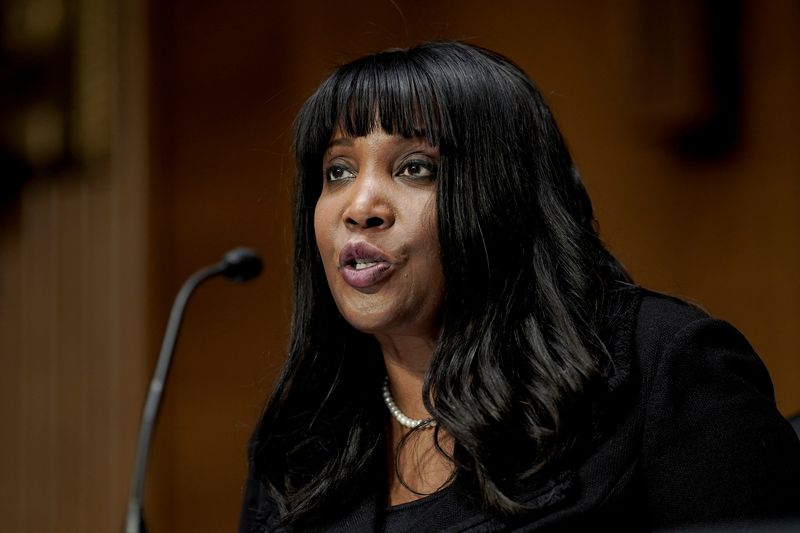By David Morgan
(Reuters) -Lisa Cook, an economics professor at Michigan State University known for her work on racial and gender inequality, on Tuesday won U.S. Senate confirmation to serve on the Federal Reserve Board, making her the first Black woman to serve on the Fed board in its 109-year history.
Cook will join the U.S. central bank as it faces a monumental challenge: reining in 40-year-high inflation that is straining household budgets and sapping U.S. President Joe Biden’s approval ratings without undercutting a historically strong labor market or sending the world’s largest economy into recession.
Senate Banking Committee Chair Sherrod Brown called Cook’s confirmation “historic.”
Not a single Republican supported her, and the Banking Committee’s top Republican, Patrick Toomey, said he feared she would not be tough enough on inflation.
Vice President Kamala Harris cast a tie-breaking vote in the evenly divided Senate, making the final tally 51-50.
Cook’s term will run to January 2024.
“That is fantastic news,” said Atlanta Fed President Raphael Bostic. “Lisa was a student of mine. She is a fantastic economist and will bring a welcome voice.”
The Fed raised interest rates in March for the first time since 2018, and last week delivered the first in what is expected to be a series of half-point rate hikes, double the usual size, as policymakers try to slow supercharged demand for both goods and labor.
Cook, who will help set U.S. monetary policy with the rest of the seven-member board and the heads of the 12 regional Fed banks, is not expected to change that trajectory.
Cook was an adviser on the transition teams for both the Biden-Harris and Obama-Biden administrations. She has written extensively about racial disparities, documenting the negative impact of anti-Black violence and gender inequality on innovation and economic growth.
“The Fed Board needs governors who understand how the economy works for Americans across race, gender and class, and Dr. Cook’s deep expertise makes her exceptionally qualified to serve,” said Michelle Holder, president of the Washington Center for Equitable Growth.
The Senate last month confirmed Fed Governor Lael Brainard as the U.S. central bank’s vice chair, with several Republicans joining Democrats to confirm her.
Two other nominees to the Fed – Jerome Powell, renominated to his current position as the central bank’s chair, and Davidson College dean of faculty Philip Jefferson, who like Cook is both Black and an economist – have bipartisan support but it is uncertain when the Senate will take up their confirmations.
Biden plans to fill the last of the Fed board’s seven seats by nominating former Treasury official Michael Barr to be the Fed’s vice chair of supervision.
His initial pick for that post, former Fed Governor Sarah Bloom Raskin, withdrew from consideration after Democrat Joe Manchin joined a united Republican front opposing her nomination.

Source : Reuters

